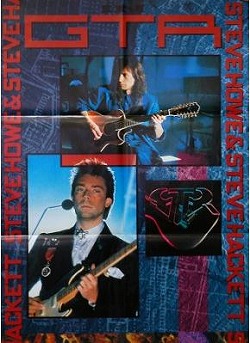| B i o g r a p h y |
 GTR was a supergroup founded in 1986 by ex-Genesis guitarist Steve Hackett and Yes and Asia guitarist Steve Howe. Other members included vocalist (and former milkman) Max Bacon (ex-Moby Dick, Nightwing, Bronz), bassist Phil Spalding (ex-Bernie Torme, Toyah, Mike Oldfield, Original Mirrors), and American drummer Jonathan Mover
(ex-Marillion, later of Steve Vai fame). GTR were notable for
attempting to create a band with guitar and synthesizer sounds, but
without the use of conventional keyboard synths, using guitar-based
synthesizers instead. Hackett and Howe's guitars were outfitted with
Roland synthesizer trigger pickups, which used the vibrations of the
strings to create MIDI signals used to play the synthesizers. While
this may have worked in the studio, they were forced to take a
keyboardist on the road because of the poor tracking qualities of the
guitar synths.
GTR was a supergroup founded in 1986 by ex-Genesis guitarist Steve Hackett and Yes and Asia guitarist Steve Howe. Other members included vocalist (and former milkman) Max Bacon (ex-Moby Dick, Nightwing, Bronz), bassist Phil Spalding (ex-Bernie Torme, Toyah, Mike Oldfield, Original Mirrors), and American drummer Jonathan Mover
(ex-Marillion, later of Steve Vai fame). GTR were notable for
attempting to create a band with guitar and synthesizer sounds, but
without the use of conventional keyboard synths, using guitar-based
synthesizers instead. Hackett and Howe's guitars were outfitted with
Roland synthesizer trigger pickups, which used the vibrations of the
strings to create MIDI signals used to play the synthesizers. While
this may have worked in the studio, they were forced to take a
keyboardist on the road because of the poor tracking qualities of the
guitar synths.
GTR's only studio album, a self-titled LP produced by Geoffrey
Downes of Asia, released by Arista Records, went gold and spawned a hit
single, "When the Heart Rules the Mind", which stayed in the charts for
16 weeks. Another single, "The Hunter," received some video coverage
and modest airplay. While GTR's album was a chart success, it is highly
debated with many fans of Genesis and Yes. Some fans claim it has
rather substandard filler material and some criticism directed at Max
Bacon's strident tenor. J.D. Considine's review of the album simply
read, "SHT.". However, it has become somewhat of a cult classic among
fans, with some of them regarding it the best work ever.
After a poorly conceived trans-Atlantic tour, Steve Hackett's
dissatisfaction with the group's financial management spelled the end
of the project. Subsequent to an abortive lineup change in 1987,
Hackett left GTR, stating it had been "interesting for about five
minutes". Other fans have also speculated that Steve Howe and Steve
Hackett did not get on well. Hackett's subsequent comments about GTR
have been ambivalent at best. He once said of the group, "there are
artistic limitations with any successful band and it was a successful
band."
The King Biscuit recording from Los Angles prove that the group was extremely tight and well practiced live. The live recording also brings out the best in Max Bacon's voice and shows their true performing power and abilities. Tracks include killer versions of Yes' "Roundabout" and an epic re-working of the Genesis classic "I Know What I Like" as well as songs from the band's sole studio album, Hackett's and Howe's solo LPs and the U.S. Top 40 single "When The Heart Rules The Mind". Also, a preview of a new song, "Prizefighters", was included on this collection. The song was later developed for Steve Hackett's planned 1986 release "Feedback" (only eventually released in 2003).
After this, the band disbanded with Steve Hackett returning to
stronger solo releases including "Guitar Noir". Steve Howe tried to
reform the group with Robert Berry as a guitarist and lead vocals,
however it is rumoured that Max Bacon did not like being pushed back to
second lead vocalist and became distant from the project. The bootleg
of the second album sessions called 'Nerotrend' features half the music
sung by Berry and half sung by Bacon. Various bits of this release have
appeared on future albums, including the song 'This World is Big Enough
for All of Us' which became 'Birthright' on the ABWH album.
An interesting piece of GTR trivia concerns vocalist Max Bacon's
almost surreal attempt to relaunch his career following the breakup
with an appearance as a contestant on ITV's vintage talent show New
Faces. Relaunched in the late 1980s, the revamped New Faces was hosted
by Marti Caine and featured judges such as Chris Tarrant (the nice one)
and Nina Myskow (the nasty one). Max eventually reached the 1988 final
and performed a version of "The Hunter", but he ultimately lost the
competition. Interestingly, however, no mention was made on the show of
his previous GTR success.
Max Bacon's 1996 solo album The Higher They Climb included GTR material. He later sang lead on "Going, Going, Gone" on Steve Howe's 1999 release, Portraits of Bob Dylan. There is also a CD of an LA GTR performance on King Biscuit Flower Hour, and even a bootleg floating around.